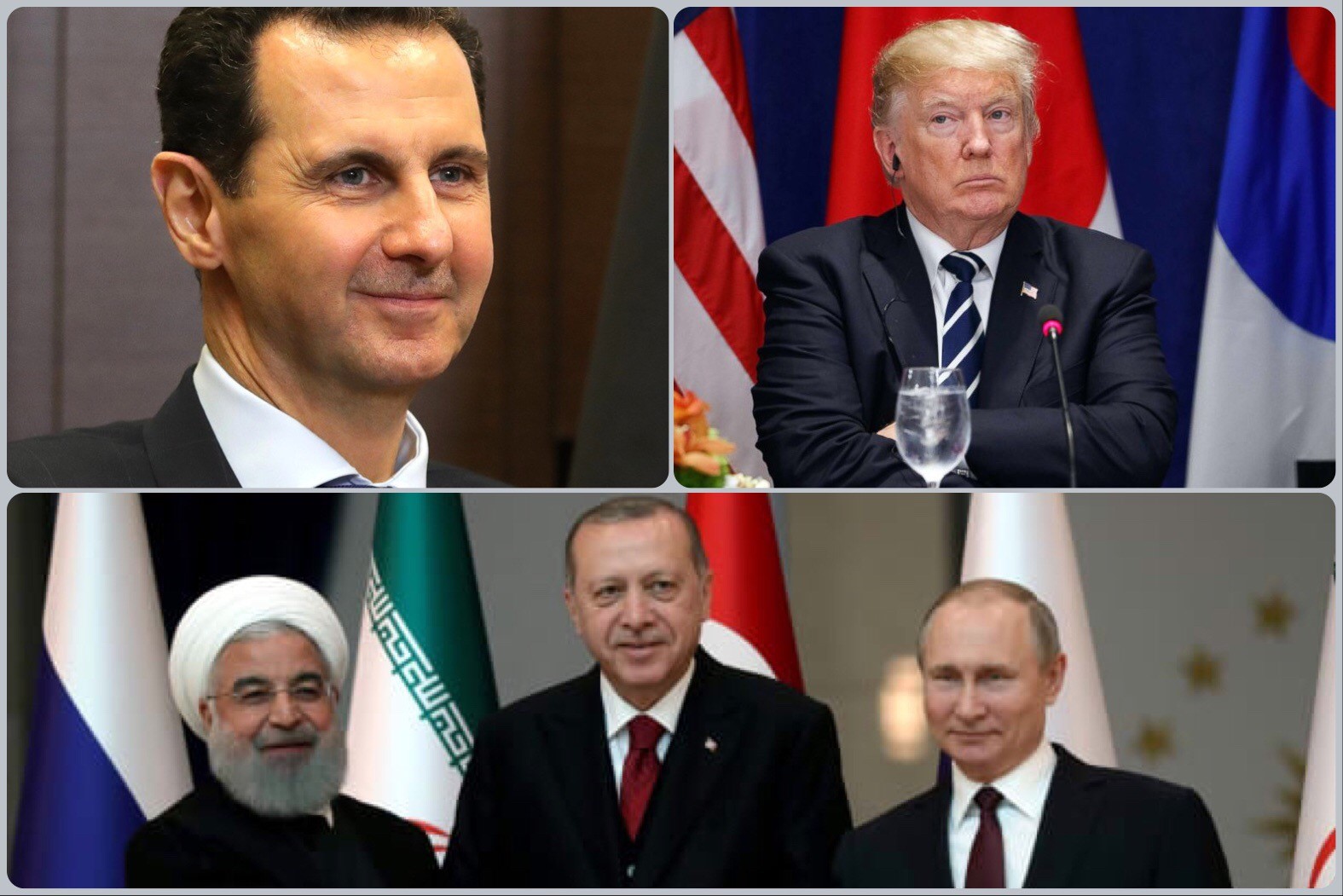Since the middle of last week the Middle East once again got the attention of the media and it was once again Syria. The Turkey announced the launch of Operation Peace Spring, with the official intention to crush the mostly Kurdish Quwwāt Sūriyya Dīmuqrāṭiyya [Qasad] militia within Syria, which under American-French–Israeli patronage was seeking to create a separatist entity. Much like the case in Iraq. This is nothing new, since it was announced weeks ago, ever since Syria was liberating large parts of Northern Ḥamā and Southern Idlib. The plan also included from the very first announcement a safety zone to be created by the Turkish troops all along the Syrian border, in a depth of some 20-30 km. From the very first day the idea came up there was substantial unclarity, what would that mean to the American presence in Syria. Both because it is illegal, and because Trump wanted to pull out almost a year ago. There was also the question what would happen if the invading Turkish troops would have to face Syrian troops, let alone the Russians. Because the Syrian state and army, regardless of the general conception, is very much present even in to the east of Euphrates, in the two biggest cities, al-Qāmišlī and al-Ḥasaka. Which are key points if the Turks wish to deepen their presence and truly break Qasad, as they announced, not just chase it away from the border.
The campaign started with a shocking barrage in the north by the Turks, and soon continued with ground operations, which were mostly conducted not by the Turkish troops themselves, but their – per minute – allies, the so called Syrian National Army, a wide range of militias with very dubious backgrounds.
Since the operation started the change in the Syrian political spectrum is huge, though not so much by the direct Turkish military presence. In one hand a wide range of countries condemned the action, from Syria and Iran to EU members and the US. Even the Arab League, of which per minute the present Syrian government is not even a member, suddenly realized that Syria is an Arab country and showed a “valiant” gesture of condemnation. Undoubtedly the most funny, still puzzling of all is the American position. Washington so far was illegally occupying Syria and couldn’t be bothered by any, yet now withdraws. Curious it is to see why Washington now posed new sanctions on Turkey, while not even tries to hold up the Turkish onslaught physically. And while moving out America betrays one ally, alienates another, and curse another set of them, which were very dear fiends for so long. But on the other hand, while Syria in understandably condemns the Turkish action, it gets the best out of it. Syrian troops moved into a set of symbolic and strategic positions, which were even a week ago were seen impregnable by experts.
It is many times said that a true nature of a step can be measured by those, who oppose it. These are not few now, but it seems the Turkish move created a situation, when everyone, or at least almost everyone is a winner. Ironically even Trump and the Kurds. How is that possible, and why in fact now Turkey made the biggest favor for Damascus? That shall be our topic this week.
The web of complexity
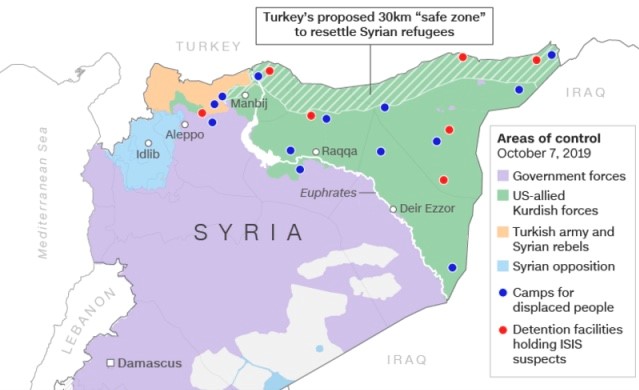
We touched lightly last week how complex was the situation in Syria even a week ago. After years of foreign sponsored terror groups fighting against the Syrian state, by late 2018 only three major challenges were left ahead of Damascus. The American direct occupation in the south, at at-Tanaf, under the shelter of “Syrian opposition forces”, many of them former Dā‘iš cells, which on 25 July 2018 struck as-Suwaydā’, a thus far peaceful province in the south, leaving 220 dead. That so far seems to be non-negotiable for Washington. The second was Idlib, where all other terrorist cells converged under Turkish umbrella, and were holding on until this summer, when the Syrian Arany conducted a major operation against. That was highly successful and was only halted by a unilateral ceasefire by the Syrian Army. At that time there was a major Turkish-Russian-Iranian initiative to return to the Sochi agreement, while on the other hand Turkey told the US that soon it will invade in the north to crush Qasad and to create a safe zone for repatriation of millions of Syrians.
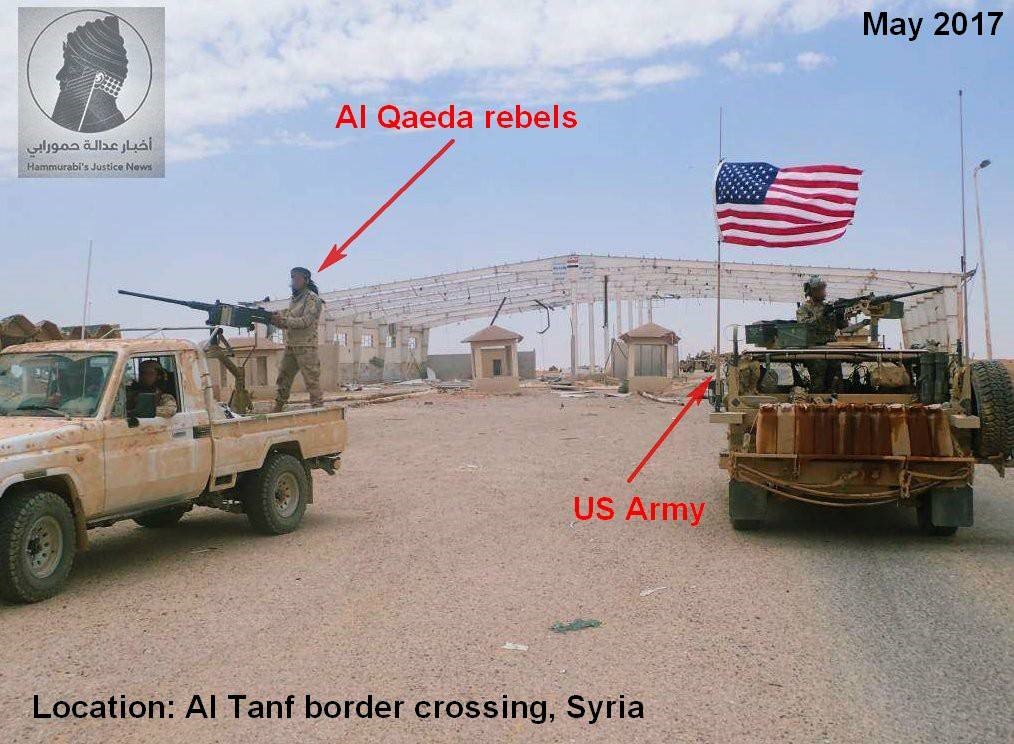
These dealing surely payed a huge role in Syrian decisions to temporarily cease the operations in Idlib, to so see the result. Because that is the third major obstacle for Damascus in the road ahead for complete liberation. And that is the most valuable and most delicate of all. At-Tanaf might be sensitive, but has no major impact as long as it can be sealed off. Idlib has substantial agricultural, even moral value, but it is not unsolvable. But the East is where most of the Syrian oil wealth can be found, and there is a substantial Kurdish presence there, which so far demanded autonomy. That had the risk to open a road similar to what happened with Iraq, though here the ethnic composition is much more complex and the Kurds don’t represent a majority. Not yet. Still, they provided the pretext for the illegal American occupation, which aimed to suffocate the Syrian government economically.
For the Americans the case in the east is just as puzzling. Trump, very accurately realizing that there are much bigger matters in the region and this relatively small card drains way to much energy, wanted to pull out last year, but the establishment so far stopped him. While Trump would have neglected this opposition, mostly by hawks like Bolton, many of whom left by now, but there were several problems with this pull out. Problems even Trump not have disregarded. The biggest among these are the Dā‘iš captives locked up by the thousands, many of whom are Western citizens. The original pretext for the Americans invasion was to defeat Dā‘iš, thought they had major role in creating them. So leaving thousands of Dā‘iš captivates behind seemed impossible. That is why Trump tried relentlessly to persuade EU member states to take these in. Not surprisingly the very European states, which condemn the Turkish push were not eager to comply to these demands. It was also a major complication for the Americans, not so much for Trump, but the establishment, not to abandon the Kurds, who can prove to be a major card against any state in the region, as they were for centuries in the hands of the resident superpower. Trump’s response for all these matter is clear now. He leaves all that to the Turks as he closes this folder and happens what happens. After all, as he put it, Kurds did not help the US in Normandy.
The establishment might be very angry now, but in fact Trump got what he wanted, a reason and a climate to get out. Which can be a huge asset for him in the next elections. Because he brings troops home as he promised in the campaign and closes a chapter, which even Clinton admitted, the previous administration created at the first place.
The matter is just that delicate for all others concerned as well. For Turkey, it is clear by now that after years of desperately betting on it, the Syrian government will stay the same and there will be no new government for the likings of Ankara. But there are millions of Syrian citizens in Turkey now, who cause distress in the population. And as opposition grows in Europe to take them in, it is clear they won’t leave to the EU. But they won’t leave to Syria either in this scenario. Erdoğan surely would have loved the idea to pose a new government in Damascus and after its creation flush the country with millions of refugees, who would have meant a basis for a friendly administration. This will surely not happen. Not only them, but the thousands of militants supported and trained by Turks – and the West – for years also might just end up in Turkey. While this plan was clearly coming to a dead end, the case was about to end with a Kurdish enclave in Syria under direct American and Israelis patronage, which is a huge security threat for Ankara. Leaving that to grow would have meant a historical error for Erdoğan, which he surely realized.
The same pretty much applies for Iran as well. While Tehran has little interest in the east of the Euphrates, it clearly wants to see a stabile and formidable Syrian ally on the ground connecting it via Iraq to Lebanon, and putting Iran on the map against Israel. Therefore a major security challenge for Syria is a security concern for Iran as well. But through the Syrians and the Russians Iran had no means to push the Americans out, while it has to be caution not to hurt Kurdish sentiments, as itself has Kurds. Any solution therefore had to come with Russian-Syrian understanding, which Iran can only support, but cannot lead. So Tehran sit back and left space for diplomacy, let the Russians sort it out with Ankara.
The Russians were concerned themselves, because in the long run they want to pull out from Syria. Not completely, but the main interests are secured now, so it would be time to end this power-draining quest. That, however, cannot be done, until a political settlement is reached. But Damascus will not concede to any final solution, which will leave the country to partition. So in one way or another Russia had to wait it out until the Americans left. But just how to do that? Military option was clearly not on the table, since a direct war with the Americans would bring unforeseeable consequences. Even just supporting the Syrian Army to go would have been unthinkable.
So all was left wonder, how to get the Americans out, which even Trumps wants, without war, and with an opportune pretext? The best solution for all now is to return these lands under Syrian control. Surely that is not the best, what the Kurds can wish for. They wished to carve out another lucrative oil enclave under Americans patronage, just like it is in Iraq. But they committed huge ethnic cleansing in the areas under they control in recent years, mostly by chasing away people, but also by massive Kurdification of the local residence. And it should not be forgotten that though they gained significant popularity in the Western press, they failed to obtain any legality, which makes their project’s future quite fragile. In this light it is not the worst for them either to accept a fait accompli, return under Damascus’s wing, get impunity for all what happened and even get some concessions in the future new constitution.
And the Turks made the trick
Only by understanding this complexity can one see why Turkey was the only player in the game that could break the deadlock. Only the Turkish Army could do, what no one else. That is not because of its military might, but by Turkey’s special position. It is the only NATO power in the camp, which wants the Americans out now. If the Turkish Army moves into these areas the Americans cannot oppose them directly, since that would instantly split the NATO, something Russian and China would be celebrating to see. But leaving the former American positions for the Turks, or for blaming them for returned Syrian control is justifiable, since Washington cannot take a fight with the second biggest NATO member. Even a stiff hide-and-seek chase for control cannot be managed, since that would surely push Ankara even further into the pro-Russian camp.
Turkey also has the best reason for the move, since no one else has such a suitable pretext. Russia has no historical quarrels with the Kurds, who pose no existential threat to them. For the Russians to take up arms against Qasad is hardly justifiable. Syria has a pretext, pointing out the separatist nature of the organization and putting up huge pile of evidences of their war crimes, but it is not deniable that Damascus has a much worse international reputation now than even the PKK. But for Turkey it is sufficient to prove that Qasad is the PKK, which even the Americans admitted, since they themselves rebranded it to Qasad, only to look more acceptable. So it is very hard to dispute the Turkish desire to crush the PKK, which since the ‘80s fought a vicious war and claimed the life of thousands, even in open terrorist attacks.
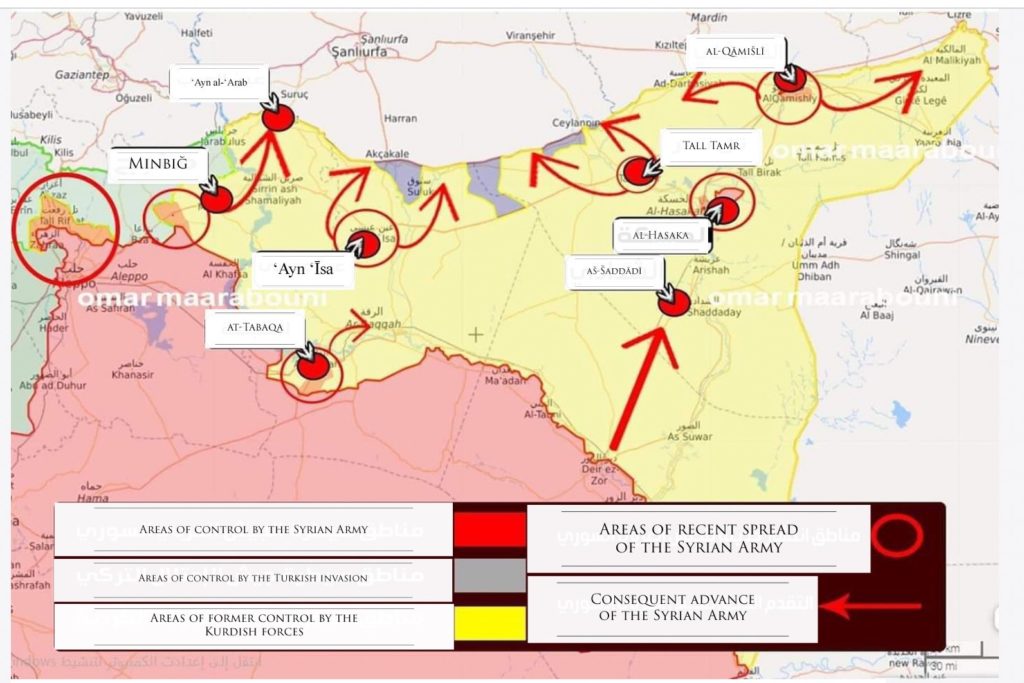
Only against the Turks the US has no capability and to pretext to prevent them eliminating Qasad, which is indeed can prove to be an existential threat to Turkey. Since they moved in, though the tension seems to be very high, Syrian troops regained areas, which were untouchable even a two weeks ago. And that scenario seems to please everyone now, whether they admit it, or not.
The Turks opened the door and the Syrians walked through it.
The Turkish Operation Peace Spring began on 9 October, with huge barrages at the area of al-Qāmišlī, which was followed by special operations between Akçakale and Çeylanpin, and a moderate ground assault at Minbiğ from the already occupied Syrian positions. Most of the ground attack was, however, carried out not by the Turkish forces themselves, but by the so called Syrian National Army, a loose formation of clearly sectarian Islamist groups, under direct Turkish command. From the first hours it was clear that Qasad will not stand a chance in front of this Turkish onslaught, which was remarkably slow in advance, as if it was not truly aiming to gain control, but rather to crush Qasad’s resistance. Which was well planned, as by Turkish reports after a week they eliminated more than 700 Qasad fighters.
One open question of this Turkish move was a possible clash between Turkish, or Turkish supported troops and the American forces, which was solved by Trump’s order on 6 October to pull all American forces out of the Syrian bases. According to the official communique Ankara agreed to take responsibility of the prisons in these areas. More surprising was the news that the American intelligence shared intel with the Turkish High Command on Qasad, enabling it to carry out precision attacks. All that points to a preliminary agreement between Ankara and Washington, or at least between Trump and Erdoğan that the Americans give way to Turkey to take over the border area. Though all reports talk about the northern section of the former Qasad controlled area, that pretty much means the total withdrawal of the American troops from Syria. Since out of the 17 official American bases in the country 16 – so all except at-Tanaf – are in this area. That puts all later American objections and threats against the Turkish operation in a different light. The explanation might has much to do with the details, since the real winner by this move was not Turkey, but the Syrian Army and state. And this development probably goes back to the tripartite meeting between Turkey, Russian and Iran on 16 September in Ankara, which officially aimed to solve the Idlib matter. Very few tangible details were aired about the meetings, but there were remarkable notions about Northern Syria and the Kurdish forces. By the results it seems likely that Turkey had an understanding with Trump, but at the meantime a very different one with Russia and Iran. That explains the harsh statements from both sides after the Operation Peace Spring began, all trying hard to keep Ankara on the formerly agreed track, not as much to stop the move altogether. Seeing all the history of this conflict it is hardly a coincidence that no one really trusted Turkey, but there were very few alternatives now.

The real victor is undoubtedly the Syrian leadership and the Syrian state by now, also reaffirming the idea that a deal struck indirectly between Ankara and Damascus. In exchange for a halt in Idlib and giving space to manage the situation there for Turkey, the Turks made a favor. Very interesting that Ankara had nothing to say to the Syrian Army’s recent gains, which were in fact huge. On the 9 October the Syrian Army was already on the move, after deal was cut between the Qasad leadership and the Syrian government on the main Russian military base, by which the Syrian Army moves in to all formerly Qasad controlled areas and the Kurds put give up their heavy weapons and positions to the Syrians. On 14 October the Syrian Army took control of the aṭ-Ṭabqa Base in the vicinity of ar-Raqqa. Two days later the Syrian Army was already in ar-Raqqa, which has a huge symbolic and strategic importance. This was the former capital of Dā‘iš within Syria, that is the city where Qasad prevented the Syrian Army to enter using American cover, and that was the biggest city under their uncontested control in the last two years. The liberation of ar-Raqqa practically ends the Kurdish dreams of a separatist state, as no major cities left under their control. This was made sure by further gains by the Syrian Army. On 14 a major battalion moved crossed the Euphrates from Dayr az-Zūr to al-Ḥasaka, a city already under mostly Syrian central control, cutting the former Qasad possessions into half. At the same day another column moved from al-Ḥasaka, liberated Tall Tamr, and was on the way to clear the highway connecting al-Ḥasaka with Aleppo. These are the biggest gains strategically, but were overweighted by other gains in the news. Also on 14 October the Syrian Army took positions in Minbiğ, ‘Ayn ‘Īsā and even entered ‘Ayn al-‘Arab. The result is that the Syrian state regained control all over the area along the Turkish border from ‘Ayn al-‘Arab to the Iraqi border, meaning all former illegal US-French bases were liberated. And which is even more significant, without the loss of even one single Syrian soldier. The effective control is still to be taken over, but by now the Army is already spread in all strategic points, which makes reestablishment of the Syrian authority only a matter of time.
One interesting point, where much of the real nature of the Turkish operation can be understood is Minbiğ. As soon as the Syrian Army moved in the Russian Military Police also moved with it, taking positions to prevent any possible clash between the Syrian and the Turkish troops. The effective result is that there are the Turkish official troops, ahead of them are their Islamic mercenaries fighting the Qasad troops, behind them is the Russian military, behind which the Syrian Army took over. This means that in effect the so called Syrian National Army, Syrian mercenaries on Turkish payroll, which the Ankara wanted to get rid off from the very beginning, kill each other off with Qasad, which has no alternative, but to surrender to the Russians and the Syrians or fight on. But if they withdraw the Syrians and Russians take over, protect the local population, and that solidifies Damascus’ point of fighting together for national integrity. This gives an opportunity to Damascus to get huge gains on the political front, as now the Kurds, who accuse the US with treachery, give up their claims for separate autonomy and accept national unity. This development mitigates the possibilities for outer forces to interfere in the upcoming new constitution draft.
The faith of the southern part of the former Qasad control is still not clear, as noticeably the Syrian Army did not move on these oil rich areas jut yet, but unlike the case was so far, when the Euphrates was a clear and easily defendable barrier, south of al-Ḥasaka there is only desert. Therefore it will be very difficult for the Americans and the French to establish a new demarcation line, especially that they lost their biggest political cover, the claim to support the Kurds. But even if such case would to prevail, the Americans have a far worse position now, and the Syrians gained new areas along the Iraqi border, where new entry points can be opened. However, understandably as the deal with Qasad is still fragile, for the time being the Syrian High Command does not press the issue, and probably advance on the oil field only after some delay.
After a major outcry in the American circles, and even by the hawks in the Trump administration that the whole situation jeopardize their relations with the Kurds, Vice-President Mike Pence and Secretary of the State Mike Pompeo – the most hawkish elements after Bolton’s departure – flew to Ankara. On 17 October they agreed in a five days ceasefire with the Turkish government. This is to be followed by another meeting between Erdoğan and Putin in Sochi, also to discuss a permanent ceasefire, to which Qasad leaders already agreed to. This will enable Qasad troops to withdraw from the border area. That might look as the operation gained very little to Turkey, as they took very little area under their control, and Qasad is still alive. But in fact this ceasefire came after the real objective was accomplished. Trump got his troops out, can celebrate the end of a prolonged and delicate involvement in Syria, and can even pose as a savior, who at the end stopped the Turks. Turkey can be happy, as the operation eliminated the immediate danger by a possible Kurdish enclave on its border, gained favor from Russia, which will come handy soon in Idlib, and even made a favor for Damascus, which opens the door for a future settlement. Russia can be happy as it made a favor for Syria and extended its influence, while stayed relatively in the background and infuriated no one. And Damascus can be happy, as joyful news are all over the Syrian press now with huge areas are liberated and the Americans are humiliated. Like in one famous footage, where Syrian troops met withdrawing Americans on the highway. And regardless of all media uproar even the Kurds can be happy, as they might lost their bid for a separatist state, but they can lay down their arms without punishment and take shelter from a possible Turkish elimination. After all, not all their cards are lost. So probably Hulusi Akar, Turkish Chief of Staff was correct to say after the ceasefire agreement with Pence that “the Turkish Army already achieved all their objectives.” That is exactly what happened.
The end of some myths.
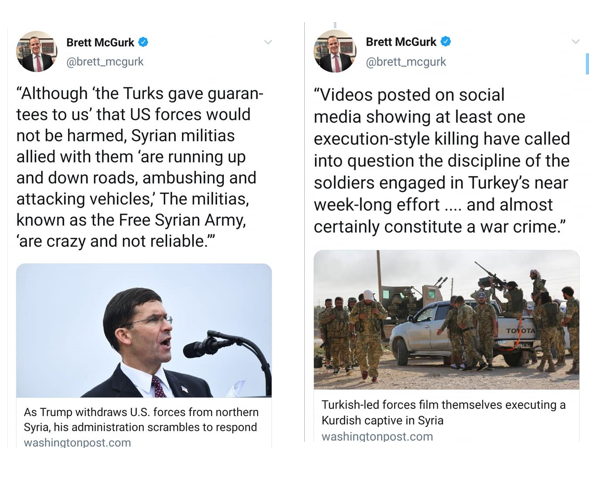
Operation Spring Peace uncovered many things, which were all clear to see for anyone with intel on the Syrian situation for years, but were concealed by careful propaganda. On that notion the Turks played their cards brilliantly. First of all they used in this operation the so called Syrian National Army, brigades that were formally all parts of the Syrian Free Army. The very core of the Western-Gulf war on Syria for years. Most of the atrocities committed against the Kurds during this brief engagement were committed by them. Like the brutal execution of Xevrin Khalaf, head of a lesser known Kurdish party. Which internationally might caused some condemnation to Turkey, but it will make it easier to disband these as simply terrorists. And this card will be very useful later in Idlib, especially if they will be jailed in massive numbers. Losing large number of them is not a real loss to Turkey. But even more significant revelations came from their use. On 11 October Turkish artillery shells landed close the American base at ‘Ayn al-‘Arab – otherwise known as Kobane -, which probably further hastening the American withdrawal. That outraged the Americans, and one of the most vocal critic was American diplomat Brett McGurk, who was until 31 December 2018 was Special Presidential Envoy for the Global Coalition to Counter the Islamic State of Iraq and the Levant. So he was the main political responsible for the American invasion of Syria under the pretext of fighting Dā‘iš. In his Twitter account he accused the Free Syrian Army with the shelling of the American base, and even with other atrocities, saying that “the Free Syrian Army [is] crazy and unreliable.” But this is the very same Free Syrian Army the West and the Gulf was supporting for years against the legal Syrian state and used as cover for all intrusions into Syrian domestic affairs. Which idea was never officially revoked, only now the context changed.
This very McGurk was the main responsible, at least according to General Raymond Thomas, Commander of the U.S. Special Operations Command, for fetching up Qasad troops and rebranding them from PKK-YPG to Qasad. By Thomas’ account they only included the word “Democratic” in the name to whitewash it and give some credibility. This shows a high level of continuity in the same project to use elements on the ground to intrude in Syria.
Another interesting note is that on 17 October Qasad leaders accused the Turkish Army for using chemical weapons against the Kurds. Though soon the claims were toned down to illegal weapons, the term “chemical weapons” was widely used. This notion, especially that it was affirmed by the same organizations, like the Syrian Observatory for Human Rights, and was dismissed largely, should put all previous accusations against Damascus in a very different light. Since here the same media campaign was applied.
Qasad also used another card, the possible re-emergence of Dā‘iš if they disappear. On 13 October Qasad claimed the escape of 785 Dā‘iš members from the ‘Ayn ‘Īsā camp with the help of the Syrian National Army. Which either means that the Free Syrian Army cooperates with Dā‘iš and uses its members, or that Qasad is lying and is only using the claim of fighting against the terrorist organization as a pretext for further support. Either way, both Qasad’s and the Free Syrian Army’s reputation is shattered by the latest events, while the standard of the Syrian Army grew immensely as they liberated areas without any claim of atrocity, and with obviously warm welcome, wherever they reasserted their presence. The happiness is clear in every town for the Syrian Army, which was for so many year depicted as massacring its own people.


